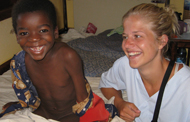Operation TLUX
2015-10-10
It was on one of my days at my praktikum I heard there would might be a patient who would receive a lungtransplant. Already at the beginning of my praktikum here at the ICU ward “9D Transplant” at AKH I told my supervisor it would be my higest wish to be watching an organ transplant. Though the lung-transplant (besides of the combination transplant heart-lung, which is not made that often anymore) is the biggest kind of transplant you can do compared to any other transplants.
So there I was, put to the operation. It took a while, because there are a lot of doors before I could reach the right operating-room and find the right operation-nurse who would take care of me. At first Dina took care of me, but they changed later and afterwards Brigitte was the operational-nurse who explained a lot to me. She was a wonderful woman who guided me through a lot of my questions and even had so much more information I would never find in a school-book.
So there they where: 2 big boxes containing a lot of ice and one lung each – of course packed in 3 plastic bags to contain steril. There where a lot of people in the operation-room. I counted at most 13 people: 2 operating surgeons, 1 surgeon-student who was assisting, 2 operation-nurses (one assisting at the surgery at the time, the other assisting the nurse who assisted the surgeons), one person watching the ECMO-machine (a mashine I already wrote about earlier), 2 foreign doctor-students, one other student (for a job where they sterilize probs for operations), 2 anasthesia-personnal (I think on nurse and one doctor) and med. So you can understand that it wasn’t so easy to take a look at the operation. I wasnät able to see everything, but I cpould see a lot. E.g. I could see how the cheast really looks like spare-ribs from the inside. I was even allowed to touch the new (through the plastic bag) and the old lung with gloves on, but I could feel the damage on the old lung.
The person who was operated on was a girl, 18 years old. She had lung-fybrosis which is a disease who gives the person not only a hard time to breath after some years, but it also gives the person problems with hormones. That means that this girl actually looked like she only was 12 years or younger. Now, the new lung was from a boy only 14 years old. The operation-nurse sayed the lung was really beautiful and it would be good for the girl to get such a beautiful lung!
I feel really gifted and happy for this opportunity, because to be part of and watch an organ-transplant was my greatest wish at my internship at AKH. They called this surgery school-book-example transplant becaause a lung-transplant often needs 8-10 hours of operation. Even the recovery of the girl went well and she could get from our traansplant-ICU to an ordinary ward within 2 days.
This transplant was a dubble-lung-transplant. Earlier years they mostely used to transplant only one lung, but it is now more common to transplant 2 lungs at the same time. In Vienna the lung-transplant is a really common transplant-procedure and approx one lung per 10 days is transplanted in Vienna. Acctually all lungs in Austria are transplanted at AKH in Vienna. But that doesn’t mean that it isn’t a complicated procedure. There are some risk to consider by having lungs transplanted in your body. E.g. is the approx life-time of the transplanted organs 10 years, which means that this girl might has to have another lung-transplant in some years. Of course not having a trannsplant wouldn’t have been an option in her case, though of her heriditated disease, but you should consider smoking or not wearing masks in certain working-enviironments – for the health of your lungs. Other complications by transplanting lungs ccan be infections, but there is a risk that the organ that is transplanted not is in a good condition. I have still not really understood why the AKH do transplant organs that are not fully fit for transplant (e.g. a lung that is from a smoker and not so much better thann the lung the person had before – this does not regard the young girl, but other patients I have seen). But I can think of 2 reasons why:
- There are not enough organs to choose between. Austria is indeed one out of 3 counttries in Europe where every human beeing automatically is a organ-giver (besides you write a will not to before you get sick/die), but they are also part of an organization ccalled “Eurotransplant”. This is a organization between 8 european countries which work together to distribute organs in these countries. But, they do still have a transplantt-list and people do have to wait for organs. So if there is a person in desperate need for an organ, the person will get it, even if it is not fully fit.
- Prestige of doctors – doctors who like to do surgeries and want to keep up a high rate of organ-transplant on their Curriculum or for the hospital. Or because people “buy iin” themselves for an organ. I have accutally heard that this was possible once, but I have no idea if it still does.
- There is procedure where you can put e.g. a lung in a glas cube to ventilate it before extransplant it.
















 När man läser till sjuksköterska på Linnéuniversitetet kan man göra en del av sin utbildning i ett annat land. De studenter som har valt att göra det delar med sig sina erfarenheter i den här bloggen.
När man läser till sjuksköterska på Linnéuniversitetet kan man göra en del av sin utbildning i ett annat land. De studenter som har valt att göra det delar med sig sina erfarenheter i den här bloggen.